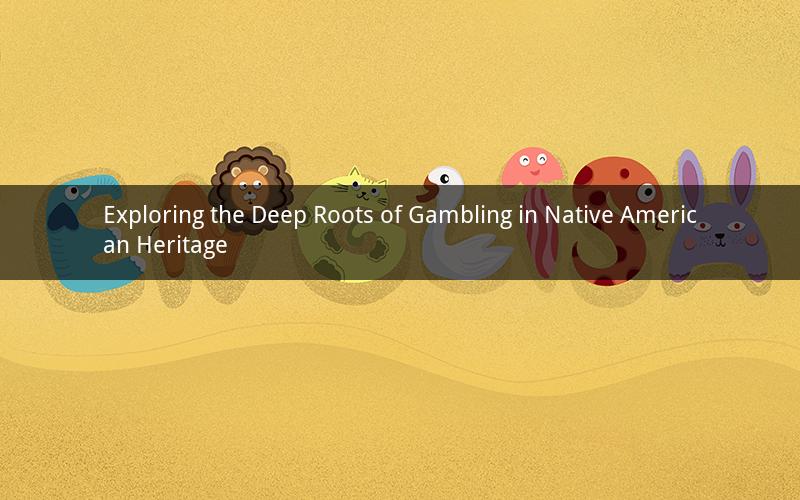
Gambling has been a long-standing tradition in Native American heritage, deeply intertwined with the cultural identity and spiritual beliefs of various tribes. From the early days of the continent to the present, gambling has played a significant role in the lives of Native Americans. This article delves into the origins, significance, and impact of gambling in Native American culture.
1. The Historical Origins of Gambling in Native American Heritage
The origins of gambling in Native American heritage can be traced back to ancient times. Many tribes practiced forms of gambling for entertainment, social gatherings, and rituals. These games were often based on chance, skill, and the use of natural elements. Some examples of traditional Native American games include stick games, dice games, and card games.
2. Cultural Significance of Gambling in Native American Society
Gambling in Native American culture has served various purposes beyond mere entertainment. It has been a means of social bonding, a way to honor ancestors, and a tool for spiritual connection. Here are a few cultural significance aspects:
- Social Bonding: Many Native American tribes held gambling events to bring people together, fostering a sense of community and unity among members.
- Honoring Ancestors: Some tribes used gambling as a ritual to honor their ancestors and seek their blessings. These events often involved offering prayers and giving thanks to the spirits.
- Spiritual Connection: For some Native Americans, gambling is a way to connect with the spiritual world. They believe that the outcome of a game can be influenced by the divine, and thus, they use it as a medium to communicate with the spirits.
3. The Role of Gambling in Economic Development
In recent years, Native American tribes have leveraged their gambling heritage to create economic opportunities for their communities. Casinos and gaming establishments have become a significant source of revenue, funding various projects and programs. This economic empowerment has allowed tribes to improve infrastructure, education, healthcare, and social services.
4. Challenges and Controversies Surrounding Native American Gambling
While gambling has brought economic benefits to many Native American tribes, it has also raised several challenges and controversies. Here are a few:
- Addiction: Gambling addiction has become a significant concern for some Native American communities, leading to social and economic consequences.
- Cultural Misappropriation: Critics argue that the commercialization of gambling in Native American heritage can lead to cultural misappropriation and dilution of traditional values.
- Legal Issues: The expansion of gambling in Native American territories has faced legal challenges, including jurisdictional disputes and concerns over the impact on neighboring communities.
5. The Future of Native American Gambling
As Native American gambling continues to evolve, tribes must navigate a complex landscape of challenges and opportunities. The future of Native American gambling may involve a more balanced approach, integrating traditional values with modern economic strategies. This could include:
- Strengthening Cultural Preservation: Native American tribes may focus on incorporating traditional gambling practices into their gaming establishments, ensuring the preservation of cultural heritage.
- Promoting Responsible Gambling: Efforts to address addiction and promote responsible gambling practices among Native American communities may become a priority.
- Fostering Community Development: Native American tribes may continue to invest in community development projects, using gambling revenue to improve the overall well-being of their members.
5 Questions and Answers about Native American Gambling Heritage
1. What is the most common form of gambling in Native American culture?
Answer: The most common forms of gambling in Native American culture include stick games, dice games, and card games. These games have been adapted and modified by different tribes over time.
2. How has gambling contributed to the economic development of Native American tribes?
Answer: Gambling has contributed to the economic development of Native American tribes by generating significant revenue, which is used to fund various community projects and programs.
3. Are there any concerns about the impact of gambling on Native American communities?
Answer: Yes, there are concerns about the impact of gambling on Native American communities, including addiction, cultural misappropriation, and legal issues.
4. How can Native American tribes preserve their gambling heritage while adapting to modern times?
Answer: Native American tribes can preserve their gambling heritage by incorporating traditional practices into their gaming establishments and promoting cultural education and awareness.
5. What role can the government play in addressing the challenges surrounding Native American gambling?
Answer: The government can play a role in addressing challenges surrounding Native American gambling by supporting responsible gambling initiatives, providing resources for addiction treatment, and addressing legal and jurisdictional issues.